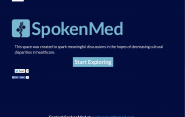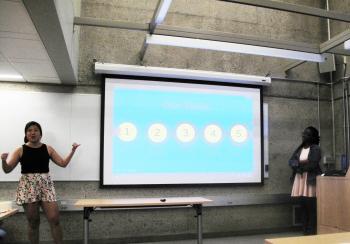
SpokenMed, an informational healthcare website developed as part of the Center for Engineering Innovation and Design Summer Fellowship, is up and running and seeking contributors.
The website, developed by students Tiwa Lawal, Joyce Guo and Dhiksha Balaji, serves as a forum and online resource where members of different cultural groups can connect with other people in their community to discuss a broad range of concerns, questions, and experiences. SpokenMed empowers patients of populations that are often left behind in the healthcare system to take the  initiative in their health. The information discussed and provided on SpokenMed is information particular to different minorities and cultural groups, but rarely found on other hospital websites. The goal is to reduce healthcare disparities by connecting people and providing more information.
initiative in their health. The information discussed and provided on SpokenMed is information particular to different minorities and cultural groups, but rarely found on other hospital websites. The goal is to reduce healthcare disparities by connecting people and providing more information.
The students cited a National Institutes of Health survey which found that many people who belong to ethnic minority and cultural groups don’t seek health care even when they know that they’re sick. And others who do seek care often don’t ask important questions of their doctors. According to the same survey, one of the most common answers was mistrust of medical institutions.
“We wanted to increase the conversation among these three groups so patients could be healthier,” said Lawal at a recent presentation. “So we created a website. It’s a place where all of these parties could discuss health care on level ground.”
SpokenMed allows people to pose questions about healthcare that they might not find elsewhere - for instance, whether a hospital’s food adhere to the customs of a specific religion. Ideally, these questions will lead to discussions from a diverse set of contributors.
To get an idea of what kind of questions people might have, they sought out religious and cultural leaders in the community. One rabbi told them that patients often come to him for information about end of life care, and that his answers might differ from those given by a surgeon.
There’s also a component that features expert contributions. These are essays from healthcare workers and community and religious leaders about cultural-based disparities in healthcare.
“We’re hoping to expand the number of users on our website as well as the number of contributors,” Lawal said. “In the coming year, we are working on generating more content and updating the website as we get feedback.”